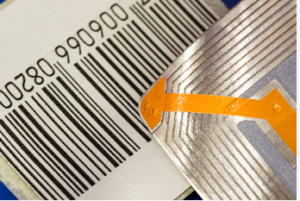Retailers need accurate inventories, real time merchandise locations and enhanced security. With RFID retail pos system, conventional systems can be integrated to streamline store operations and reduce labour costs.
 For example, you can offer to buy online pickup in-store as a customer service and eliminate the need for scanning each item at checkout. Other benefits include:
For example, you can offer to buy online pickup in-store as a customer service and eliminate the need for scanning each item at checkout. Other benefits include:
Faster checkouts
Retailers are finding new ways to use RFID technology to improve operations, and this includes at the point of sale (POS). This solution can help retailers speed up checkouts by eliminating manual barcode scanning and enabling faster payment processing. It helps create a better shopping experience for customers and improves store productivity.
POS systems that have been configured with RFID read the items in shoppers’ carts instantaneously, eliminating the need for manual scanning of each item and allowing them to move through the checkout process up to 50% faster. RFID tags also enable enhanced inventory management, as they can quickly identify which items are no longer on the sales floor. It gives retailers a more accurate view of inventory and allows them to make smarter stocking decisions.
Real-time stock management
With a retail POS system that uses RFID, stock information is updated in real-time. It ensures that the correct products are on the shelves at all times and minimizes inventory carry costs. In addition, the software can identify products that are out of stock and automatically send an order to the supplier.
Another benefit of the RFID retail pos system is that it eliminates line-of-sight requirements. The system can track items in any direction without having to be within a certain range of the reader, which can save retailers significant amounts of time and energy. Furthermore, RFID readers are connected to a cloud platform that updates their settings and firmware over the internet. It allows retailers to avoid costly hardware replacement and minimizes labour costs.
Retail stores face many challenges. In addition to increasing ecommerce competition, they must address rising overheads and supply chain interruptions. Additionally, they need to improve product visibility and reduce shoplifting and employee fraud—a $94.5 billion problem in the US alone. The good news is that implementing RFID technology can help them overcome these challenges. Using RFID in self-checkout kiosks speeds up the checkout process, shortens queues, and provides customers with a faster and more convenient experience.
Item-level inventory management
In many cases, RFID deployments are a multi-project endeavour that requires buy-in from employees and departments. It’s important to map out the use cases that will make the most impact and ensure that your solution is solving the right pain points for your business.
Item-level inventory management is a powerful way to reduce stocking errors and improve overall store performance. Unlike barcode scanners, RFID tags allow for item-level scanning, so you can know what’s on the shelf and how much of each product is on order or sold exactly.
RFID retail POS systems also enable real-time visibility into stock, giving you the information you need to serve customers and maximize profit. It is especially important when it comes to omnichannel initiatives like buy online pickup in-store (BOPIS).
Loss Prevention
With a real-time view of inventory, your store associates have all the information they need at the point of sale to deliver ultra-fast checkouts. But that’s not all: RFID at the point-of-sale also offers omnichannel, loss prevention and customer experience benefits.
With the RFID retail pos system, you get a clear view of how products move throughout your store and the ability to connect that data with theft trends. For example, if you notice that items with tags on them are frequently taken into and out of fitting rooms, an alarm could sound at the exit to alert staff and deter shoplifting. It is undeniably beneficial in monitoring your business effectively and efficiently.
Additionally, RFID can be used to track what is picked up or tried on but not purchased. That way, you can remarket to those customers or capture valuable data on how they use and wear your product.